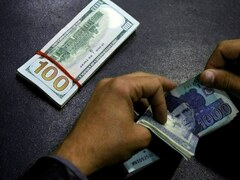Arab Health in Dubai: where companies looked for the ‘wow effect’ for Pakistan’s pharma industry
DUBAI: Dubai’s Arab Health medical expo could be the medicine to the Pakistani pharmaceutical and surgical industry’s market expansion desires.
“Five years ago when we came here, we were in five markets and now we’re in 13,” said Khalique Ur Rehman, associate director International Business, Shaigan Pharmaceuticals (PVT) LTD. “We are already under registration in 12 more markets. The event has helped us go from four to 25 markets, so it is a ‘wow effect’.”
He was talking to Business Recorder on day two of the expo’s 50th edition, held from January 27 - 30 at the Dubai World Trade Centre, where several hundred visitors interacted with healthcare manufacturers and distributors.
Shaigan - an Islamabad based company - was using the Arab Health platform to showcase its line of pharma, nutraceutical and veterinarian medicine, said Rehman.
“Right now, we’re exporting to 13 countries and our target is to export to 30 countries by the end of 2025,” he added. “Being here is always a pleasure. We get the benefit of meeting new people and the opportunity to enter new markets. We want these events to continue.”
A few stalls down in the Pakistan Pavillion, Emad-ud-Din, manager export of Don Valley Pharamceuticals, said he was experiencing a similar wave of good fortune.
“We’ve had six, seven new clients visit us. Two, three existing clients will also visit us, so we’re waiting for how things will be,” he said, adding that in addition to serving the domestic market, Don Valley sends products to different parts of the world, such as Kenya, Nigeria, Burundi, Yemen, Myanmar, Cambodia, and Afghanistan.
“Our main focus is to develop good connections in countries where we’re not currently having clients,” Emad-ud-Din said, adding that the company hopes to further penetrate the African and South East Asian markets.
Talking about the Lahore-based pharma’s future plans, he said dealing with the rise in diabetes, cardiovascular diseases, hypertension as well as a decline in reproductive health are tasks on Don Valley’s agenda.
Insulin produced locally
Meanwhile, Osman Khalid Waheed, CEO at Ferozsons Laboratories Limited, said their company is already on track to make insulin accessible for the Pakistani population.
“Diabetes is a global epidemic now and Pakistan has the highest prevalence in the world,” he said. “In the previous years, when we had the financial crisis, there were routine shortages of insulin, which is critical for patients to have, so we started producing insulin locally in Pakistan.”
The company’s steps in the industry follow the founder’s vision: “we must do work that is commercially sustainable but it has to have a direct impact on human development,” said Waheed.
To get to any foreign market, you have to first demonstrate the use case in your own country, he said.
“We’re engaged in multiple post-marketing clinical trials in fatty liver disease, heart failure, obesity, and weight gain,” Waheed said. “In all four segments, we have ongoing studies, which hopefully the trial centres will start publishing in a few months.”
Access to life-saving drugs is unevenly in emerging markets, Waheed noted, adding, “Our main ambition was to democratize access to what is now cutting edge diabetes treatment.”
Ferozsons is also producing semaglutide, a biological molecule commonly used in another diabetes-related drug commonly known as Ozempic, he said.
“Our semaglutide is a quarter of the price,” Waheed noted. “We’re doing the same for insulin. We’re trying to make sure to target underserved market first.”
It was Ferozson’s first time attending the event and the company CEO said they will definitely return next year.
Another first-time attendee, Umer Mukhtar Ali, manager director, Medicta Instruments, said they would be back next year but will look for ways to increase foot traffic.
“We will come back next year as a private exhibitor for more foot traffic and better access to customers,” he said, referring to the different levels offered to exhibitors at the venue.
Ali was representing one of Pakistan’s Sialkot-based claim-to-fame industries: surgical instruments. Medicta exports mostly orthopedic and general surgical instruments.
“In Arab Health, we’re looking forward to meeting distributors mainly from the Gulf and some African countries,” he said, adding, “because they don’t have easy access to Europe, many people come here from Africa.”
Industry peer Mark Medical Instruments was also showcasing multiple products, such as orthopedic, retractors, eye instruments, audioscope, and cardiovascular instruments for heart surgery.
“It’s my second year at the event - we have gained a lot of things from here, some customers and a lot of knowledge,” said Saboor Shahid, marketing and sales manager of the Sialkot-based company. “We got to interact with a lot of international companies face-to-face and that makes a lot of difference.”
According to an event press release shared with the media, this year Arab Health will host more than 40 country pavilions, with exhibitors representing over 80 countries in total, covering the Middle East, the US, Europe, Africa, and Asia.
The UAE was represented by over 200 companies, showcasing the latest innovations across nine product sectors, ranging from medical equipment and devices to imaging and diagnostics, as well as wellness and prevention.
The release also talked about a returning highlight of this year’s exhibition, the Transformation Zone, which will showcased disruptive technologies and groundbreaking innovations set to revolutionise healthcare delivery.
Copyright Business Recorder, 2025




















Comments